2013 IEEE Frontiers in Education (FIE) Conference was held in Oklahoma City, OK, from October 23-26, 2013.
Dr. Jia-Ling Lin, a research scientist from the STEM Education Center attended the meeting, and presented a paper entitled “A Framework to Examine Fidelity of Implementation of a Hybrid Instructional Model for Computer Engineering Course“. This was a collaborative work with faculty and staff members from the University of Wisconsin-Stout.
STEM Education Center at ASEE North Midwest Section Conference
2013 ASEE North Midwest Section Conference (ASEE NMSC) was hosted by North Dakota State University, at the Fargo Holiday Inn, Fargo, North Dakota, from October 17-18, 2013.
Dr. Karl Smith, the center co-director, presented the luncheon keynote, “Opportunities and challenges in First-Year Engineering (FYE) programs”
Dr. Smith and Ms. Sousada Chidthachack, a Ph. D student in Math Education, attended the conference. Ms. Chidthachack presented a paper entitled “Engineering Students Learn ABET Professional Skills: A Comparative Study of Project-Based-Learning (PBL) versus Traditional Students” in the conference. The paper was co-authored by Marc A. Schulte, Forster D. Ntow, Jia-Ling Lin, and Tamara J. Moore from the STEM Center.
http://www.whavenlabs.com/ASEEConference/html/papers/ASEE-NMWSC2013-0021.pdf
Reaching OUT for LGBT-Inclusion in STEM
Mary Hoelscher, a STEM Center graduate researcher and instructor, and Dustin Ludwikowski, a chemistry and biology teacher, partnered with the Gay, Lesbian and Straight Education Network (GLSEN) to facilitate a workshop at the 3rd National oSTEM Conference (oSTEM is “Out in STEM”) held at Google’s New York City headquarters on October 26th and 27th. Both Hoelscher and Ludwikoski completed the science education initial license program at the University of Minnesota.
The event drew approximately 200 lesbian, gay, bisexual, and transgender (LGBT)-STEM undergraduate and graduate students from oSTEM chapters across the country. Hoelscher, Ludwikoski, and GLSEN’s workshop focused on possibilities for LGBT inclusion in K-12 learning including supportive STEM teachers and LGBT-inclusive curricula. The workshop also gave participants an opportunity to learn more about careers in science teaching and research in science education. oSTEM members were challenged to pay it forward to the next generation of LGBT-identified students through outreach to assist K-12 schools.
Saturday evening, at the event’s gala hosted by the Liberty Science Center in New Jersey, participants heard from upper level management at General Motors and the Department of Energy about why they believe LGBT inclusion is central to the STEM future. Recruiters were present from several large STEM corporations on Saturday night and at the conference’s resource fair on Sunday.
General Motors, the Department of Energy, Google, Microsoft, Apple, Alcoa, and the Danaher Corporation value their LGBT employees and recognize their contributions as out participants in their companies. STEM teachers can learn a lot from their example. Our LGBT learners have great deal to contribute to our STEM classrooms and industry is looking to educators to get diverse learners ready to play a role in the scientific and engineering advances we cannot yet imagine. Colleges of Teacher Education have a big part to play in making sure STEM teachers are ready. The University of Minnesota STEM Center has been supporting LGBT-inclusive STEM teacher education since 2011.
Out in STEM, Inc. Founder and Director, Eric Patridge, AP Fritts, the organization’s treasurer, and Hoelscher presented together Wednesday, October 30th, at the Out and Equal Workplace Summit at the Minneapolis Convention Center. Their presentation addressed the needs of LGBT-identified STEM students, researchers, and professionals and how corporate employee resource groups could reach out to affect change in their local community.
Learn more about the 3rd National oSTEM Conference at http://www.ostem.org/3rd-national-ostem-conference
Local author Kao Kalia Yang to address PsTL’s FYI students
As part of the College of Education and Human Development’s CEHD Reads Common Book initiative, students and guests will attend a lecture on October 29 given by Kao Kalia Yang on her book, The Latehomecomer: A Hmong Family Memoir. The event brings together both the Department of Postsecondary Teaching and Learning (PSTL) and the College to build a years’ worth of education and events around the shared question: Can one person make a difference?
To learn more about the event and CEHD Reads Common Book, please visit http://www.cehd.umn.edu/Reads/
STEM Education Center Featured in new U Discover Campaign
The University of Minnesota has chosen to feature the STEM Education Center as part of their Discover campaign. Please check out the article at: http://discover.umn.edu/news/teaching-education/3m-supports-us-stem-education-efforts-prepare-future-leaders
Teaching better, learning better, costing less: mobile innovations
In 2010-11, CEHD Dean Jean Quam and David Ernst, CEHD’s chief information officer, speculated about the use of the newly released iPad tablet with CEHD’s 450 new freshmen:
• Could it improve teaching and learning?
• Could it reduce costs for students by leveraging digital content?
• What other benefits might there be?
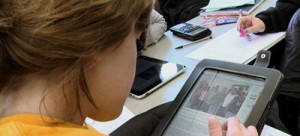 To answer these questions, CEHD administrative staff worked with faculty to help them integrate the iPads into their teaching and took a thorough look at course content to determine where costs could be reduced. After issuing iPads to incoming freshmen for the last four years, CEHD learned that iPad use by students and faculty has led to the following innovations:
To answer these questions, CEHD administrative staff worked with faculty to help them integrate the iPads into their teaching and took a thorough look at course content to determine where costs could be reduced. After issuing iPads to incoming freshmen for the last four years, CEHD learned that iPad use by students and faculty has led to the following innovations:
1. Use of Open Textbooks – Free, open-source, peer-reviewed, high quality textbooks were made available by the creation of the Open Textbook Catalog. In 2012-13, ten CEHD faculty chose to adopt open textbooks, saving their students approximately $100,000. In addition, the open license has allowed faculty to customize the textbooks to better meet their students’ needs. The initiative has caught the attention of the William and Flora Hewlett Foundation, which is considering providing funding to replicate this project nationally.
2. Digital Course Packs – CEHD partnered with the University Libraries, the Copyright Center, and the University Bookstore to create digital course packs of articles required by faculty for their courses. The new process ensures that students don’t need to purchase articles that are already licensed by the Libraries. In addition, students save money because the course packs are digital. (Students report that they prefer reading course materials on their iPads to printed versions by more than 2:1.) Students will only be charged if an article is not already licensed by the Library. In the 2012-13 pilot, nine CEHD faculty saved students over $14,000 by using digital course packs. This process is being spread University-wide including integration into the University’s course management system, Moodle, giving students a single point to access their course materials.
3. Use of Apple TV – CEHD pioneered the University’s use of Apple TVs to wirelessly project iPads from anywhere (or anyone) in the classroom. With help from the Office of Information Technology and Office of Classroom Management, this innovation has scaled to an enterprise service and is now available in most University classrooms. Apple TVs are easier to use and less expensive than smart boards, which are commonly used in K-12 classrooms.
4. Mobile Application – VideoANT is a powerful online tool that was developed by CEHD staff to allow faculty and students to give time-specific feedback on video recordings of performances. VideoANT can now be used on iPads in the field, as it is now mobile-enabled.
5. Treks Mobile – CEHD staff have extended the popular Treks faculty development program to include a Treks Mobile offering to help faculty use mobile devices in their teaching.
In addition, students have reported that the iPads positively impacted their academics by helping them:
• Complete course-related work outside the classroom (86%)
• Demonstrate their learning in more ways (85%)
• Communicate their ideas more effectively (76%)
• Feel more engaged in their courses (62%)
Read more about CEHD’s mobile teaching and learning initiatives. Also see the Star Tribune story “On campus beat: How iPad study cut text costs at U.”
CEHD retains NCATE accreditation
The College of Education and Human Development (CEHD) continues the highest standard of accreditation and has been recognized for exemplary performance in its partnership with local schools by the National Council for Accreditation of Teacher Education (NCATE).
“NCATE’s accreditation renewal for the university, which extends through 2019, recognizes CEHD’s high quality preparation of teacher candidates and other school professionals,” said CEHD Dean Jean Quam.
“This recognition means a great deal to us and to our teacher candidates,” she said. “We voluntarily pursue national accreditation, as it is not a state or national requirement, because we value the assessment of the quality of our programs against a set of very rigorous national standards and by our peers and P-12 school practitioners.”
Learn more at the CEHD news blog.
English education students thrive on new partnership with Laura Jeffrey Academy
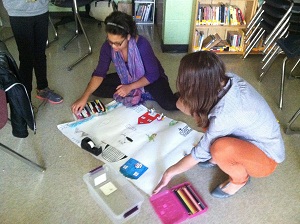 The Department of Curriculum and Instruction’s English Education Initial Licensure Program is partnering with Laura Jeffrey Academy (LJA), a year round, girl-focused middle school emphasizing interdisciplinary learning, problem solving, critical thinking, and community involvement. This fall, students in the English Education Post-Baccalaureate Program are meeting weekly with teachers and students at the school to teach an interdisciplinary English/Social Studies class. Literacy Education doctoral students Erin Stutelberg and Tracey Pyscher, along with Professor Cynthia Lewis, met with partnership administrators and teachers over the summer to develop curricular goals and activities to meet the needs of the LJA teachers and students as well as the pre-service teachers.
The Department of Curriculum and Instruction’s English Education Initial Licensure Program is partnering with Laura Jeffrey Academy (LJA), a year round, girl-focused middle school emphasizing interdisciplinary learning, problem solving, critical thinking, and community involvement. This fall, students in the English Education Post-Baccalaureate Program are meeting weekly with teachers and students at the school to teach an interdisciplinary English/Social Studies class. Literacy Education doctoral students Erin Stutelberg and Tracey Pyscher, along with Professor Cynthia Lewis, met with partnership administrators and teachers over the summer to develop curricular goals and activities to meet the needs of the LJA teachers and students as well as the pre-service teachers.
As part of the partnership, teacher candidates just completed a week of teaching LJA students during the school’s intersession with the goal of creating engaging learning experiences focused on reading, writing, and language arts. Course topics, which were developed in candidate’s Literature Methods class, included “Twitterature” focused on twitter as literature, “Tearing it up,” which asked students to consider why society values some texts over others. and “Painting Poetry,” which gave students opportunities to make art inspired by poems, write poems inspired by artwork, and create their own connected paintings and poems for a class gallery. All English education instructors visited the school to observe and provide feedback to teacher candidates.
Throughout the semester, teacher candidates experience the culture of teaching and learning at the school site through apprenticeship, practice and reflection, with many opportunities to interact with students outside of class time and field seminars held on site.
To learn more about our English Education Initial Licensure Program, please visit the program webpage.
C&I faculty and graduate students are a big success at the 2013 Bergamo Conference
Three Curriculum and Instruction graduate students, Justin Grinage (Culture and Teaching Track), Christopher Kolb (Literacy Education Track), and Sadaf Rauf (Second Languages and Cultures Track), along with C&I department chair, Nina Asher, gave two presentations at the 2013 Bergamo Conference on Curriculum Theory and Classroom Practice, held at the Bergamo Conference Center in Dayton, OH.
- Asher and Kolb presented a co-authored paper titled, “Toward Educational Re-vision in a Time of Globalization and Standardization: Looking Deeply as a Means of Breaking the Confines of Capitalism.”
- Grinage, Kolb and Rauf each presented a paper in a panel discussion called, “Race, Language, Nation, and Curriculum in a Global Context,” while Asher served as session chair. These presentations emerged out of the work the students did in Asher’s graduate seminar, Postcolonialism, Globalization, and Education last Spring and were very well received.
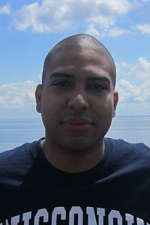 Justin Grinage (pictured) was selected as the winner of the 2013 Bergamo Graduate Student Paper Award. His paper, “Reterritorializing Locations of Home,” will be published in the Journal of Curriculum Theorizing. This was Justin’s first presentation at a national conference.
Justin Grinage (pictured) was selected as the winner of the 2013 Bergamo Graduate Student Paper Award. His paper, “Reterritorializing Locations of Home,” will be published in the Journal of Curriculum Theorizing. This was Justin’s first presentation at a national conference.
For more information about Asher’s research, please see her faculty profile. If you would like to know more about the Ph.D. program tracks mentioned, please visit our Future Student – Ph.D. webpages.
Karl Smith- Honorary Doctorate at the Universiti Teknologi Malaysia
Karl A. Smith, STEM Education Center Executive Co-Director, Civil Engineering Emeritus Professor, and faculty member in the Technological Leadership Institute is being awarded an Honorary Doctorate at the Universiti Teknologi Malaysia (UTM) at the 51th Commencement Ceremony on October 26, 2013. The recognition is based on his “outstanding and excellent contribution pioneering engineering education at the global stage.” Professor Smith has been a Visiting Professor at UTM since 2006 and helped start their engineering education PhD program.
C&I’s Diane Tedick represents the U.S. in international seminar on language immersion teacher education
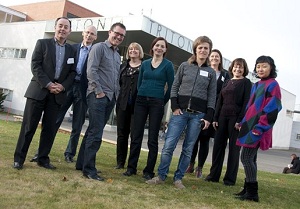 Curriculum and Instruction Associate Professor, Diane Tedick represented the United States at an international expert seminar on language immersion teacher education, held Oct. 15-16 at the University of Vaasa, Finland. In addition to the U.S. and host Finland, other countries represented were Canada, Estonia, Hong Kong, Ireland, New Zealand, Spain, and Wales.
Curriculum and Instruction Associate Professor, Diane Tedick represented the United States at an international expert seminar on language immersion teacher education, held Oct. 15-16 at the University of Vaasa, Finland. In addition to the U.S. and host Finland, other countries represented were Canada, Estonia, Hong Kong, Ireland, New Zealand, Spain, and Wales.
The seminar was covered by the Finnish newspaper, Vasabladet last Thursday, in the article, “Gott sprak ar ett gott rad” which translates to,”Proper language is a good piece of advice.” The article discusses parental roles and attitudes in language immersion.
For more information on Diane Teddick’s research on language immersion, see her faculty profile.
Tedick represents the U.S. in international seminar on language immersion teacher education
 Curriculum and Instruction Associate Professor, Diane Tedick represented the United States at an international expert seminar on language immersion teacher education, held Oct. 15-16 at the University of Vaasa, Finland. In addition to the U.S. and host Finland, other countries represented were Canada, Estonia, Hong Kong, Ireland, New Zealand, Spain, and Wales.
Curriculum and Instruction Associate Professor, Diane Tedick represented the United States at an international expert seminar on language immersion teacher education, held Oct. 15-16 at the University of Vaasa, Finland. In addition to the U.S. and host Finland, other countries represented were Canada, Estonia, Hong Kong, Ireland, New Zealand, Spain, and Wales.
The seminar was covered by the Finnish newspaper, Vasabladet last Thursday, in the article, “Gott språk är ett gott råd” which translates to “Proper language is a good piece of advice.” The article discusses parental roles and attitudes in language immersion.
For more information on Diane Tedick’s research on language immersion, see her faculty profile.
Learning Technologies and Ensia magazine win international design awards
Three University of Minnesota-based projects — Earthducation, Ensia and North of Sixty — received prestigious 2013 (Re)design awards recently from AIGA, one of the world’s largest professional organizations for design. The projects competed against hundreds of competitors worldwide. Earthducation and Ensia also received additional recognition as “Judge’s Choice” award winners.
 The AIGA (Re)design Awards competition has been held biennially since 2009 as a way to recognize exemplary sustainable and socially responsible design. The awards showcase “design that challenges us to (re)think the world and our choices” and are based on the philosophy that “through masterful storytelling, compelling visuals, and beautiful design, we have the power to shape the future and ignite change,” according to AIGA.
The AIGA (Re)design Awards competition has been held biennially since 2009 as a way to recognize exemplary sustainable and socially responsible design. The awards showcase “design that challenges us to (re)think the world and our choices” and are based on the philosophy that “through masterful storytelling, compelling visuals, and beautiful design, we have the power to shape the future and ignite change,” according to AIGA.
Other 2013 award recipients include projects done for Human Rights Campaign, The Bill & Melinda Gates Foundation, the Children’s National Medical Center, Earthjustice and more.
North of Sixty is a project of the LT Media Lab in the University’s College of Education and Human Development (CEHD), while Ensia is housed in the Institute on the Environment (IonE). Earthducation is sponsored by both CEHD and IonE.
North of Sixty aims to create a global tapestry of climate stories, weaving together the history and culture of Arctic communities worldwide and preserving the voices and ecological knowledge of generations.
Ensia is a magazine and event series showcasing solutions to Earth’s biggest environmental challenges. The online magazine was designed by Vancouver-based creative agency smashLAB.
Earthducation is a series of seven expeditions to every continent over the course of four years (2011-14) designed to create a world narrative of the dynamic intersections between education and sustainability.
Tiffany Moore named new Induction Coordinator
We’re pleased to announce that Tiffany Moore is the new Induction Coordinator for Minneapolis Public Schools and the University of Minnesota TERI project. In her new role, she will be working to deepen the work of supporting cooperating teacher and supervisors as mentors in the clinical experience by developing more cluster sites and residency programs in Minneapolis. She will continue to implement the Induction Model, which began at the Induction Forum in June, and support all TERI partner districts with their induction goals by holding meetings and trainings throughout the school year (all dates have already been set and given to induction leads). Please feel free to contact Tiffany anytime at her new email address: tiffany.moore@mpls.k12.mn.us.
C&I’s Eugene Roehlkepartain receives Marjorie Brown Fellowship
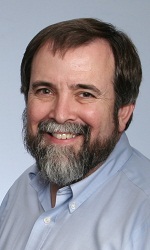 Eugene Roehlkepartain, a Ph.D. candidate in the Department of Curriculum and Instruction’s Family, Youth and Community track, was recently awarded the Kappa Omicron Nu Marjorie M. Brown Fellowship Award to support his doctoral research. With support of his doctoral advisor, Yvonne Gentzler, Mr. Roehlkepartain will continue Brown’s philosophical work using critical social theory, demonstrating understanding of Brown’s Philosophical Studies and other recent pieces of work and of their ongoing significance for the human sciences.
Eugene Roehlkepartain, a Ph.D. candidate in the Department of Curriculum and Instruction’s Family, Youth and Community track, was recently awarded the Kappa Omicron Nu Marjorie M. Brown Fellowship Award to support his doctoral research. With support of his doctoral advisor, Yvonne Gentzler, Mr. Roehlkepartain will continue Brown’s philosophical work using critical social theory, demonstrating understanding of Brown’s Philosophical Studies and other recent pieces of work and of their ongoing significance for the human sciences.
Roehlkepartain will examine how interactions between families and communities build on relational strengths within diverse families to contribute to young people’s education and well-being. He will also examine how these strengths ameliorate negative effects of stressful life events. In doing so, his research will advance understanding of the strengths and challenges of families while also examining how their engagement with community enriches family life.
Roehlkepartain is Vice President of Research and Development at Search Institute, an international nonprofit organization that provides research, consulting, and other services focused on what kids need to succeed in their families, schools, and communities. Roehlkepartain speaks and leads workshops on positive youth development, family strengths and engagement, and community engagement.
Among his research interests are exploring the ecology of youth and family development, and examining the ways in which community relationships, programs, and institutions contribute to thriving in childhood and adolescence. He is also engaged in new research on examining the developmental relationships that occur in families, schools, programs, and communities that are foundational for developing the life skills that are essential for young people thriving in education, work, and civic life.
For more information on Roehlkepartain, please visit the Search Institute’s website.
Jean Illsley Clarke awarded honorary Doctor of Laws degree
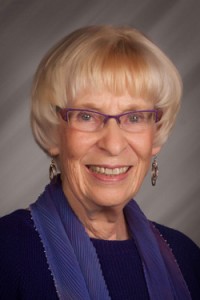 Best known for writing the seminal books on parenting, Jean Illsley Clarke, an internationally recognized family studies scholar and educator, influenced generations of parents. To honor her achievements, the University of Minnesota will award Clarke with an honorary Doctor of Laws degree at 5 p.m. on Oct. 15 at a special ceremony in the Upson Room of Walter Library, 117 Pleasant St. S.E., Minneapolis.
Best known for writing the seminal books on parenting, Jean Illsley Clarke, an internationally recognized family studies scholar and educator, influenced generations of parents. To honor her achievements, the University of Minnesota will award Clarke with an honorary Doctor of Laws degree at 5 p.m. on Oct. 15 at a special ceremony in the Upson Room of Walter Library, 117 Pleasant St. S.E., Minneapolis.
A 1948 graduate of the University of Minnesota (B.S. in home economics education, cum laude), Clarke has had a long and distinguished career focusing on ways to help parents raise likable, self-sufficient and respectful children. She is the author of Self-Esteem: A Family Affair and How Much Is Enough? Among her list of honors and accomplishments: winner of the Eric Berne Memorial Award in Transactional Analysis, 1995; a Lifetime Achievement Award from the Northwest Parenting and Family Education Conference, 2008; alumni awards from the University of Minnesota College of Human Ecology, 1999, and College of Education and Human Development (CEHD), 2001; leadership positions on the National Council on Family Relations and the Minnesota Council on Family Relations; and honoree on the U of M’s Wall of Discovery Scholars Walk.
Self-Esteem: A Family Affair is second only to Dr. Spock’s as the most influential parenting advice book. Clarke’s research and counseling, documented in her 20+ books, have been described as imaginative and practical.
“Jean Clarke is an expert on overindulgence, self-esteem, parenting, human development, group dynamics, and Transactional Analysis,” said CEHD Dean Jean Quam. “She deserves this honor for her many contributions to the disciplines of family and parent education, and for translating that work to improve families and communities around the world.”
Clarke has an M.A. from St. Mary’s College in Winona and has been an adjunct faculty member at both the U and Concordia University.
PsTL’s Stebleton and colleagues publish in Journal of College Student Retention
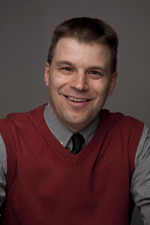 Mike Stebleton, assistant professor in Postsecondary Teaching & Learning, along with Krista Soria and Ronald Huesman, Jr., both of the Office of Institutional Research, recently had the article “Class counts: Exploring differences in academic and social integration between working-class and middle/upper class students at large, public research universities” published in the Journal of College Student Retention. This multi-institutional study examines differences between working-class and middle/upper class students at large, public research universities; using Student Experience in the Research University, SERU, data.
Mike Stebleton, assistant professor in Postsecondary Teaching & Learning, along with Krista Soria and Ronald Huesman, Jr., both of the Office of Institutional Research, recently had the article “Class counts: Exploring differences in academic and social integration between working-class and middle/upper class students at large, public research universities” published in the Journal of College Student Retention. This multi-institutional study examines differences between working-class and middle/upper class students at large, public research universities; using Student Experience in the Research University, SERU, data.
Roehrig receives national Outstanding Mentor of the Year Award
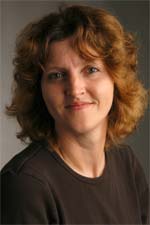 Curriculum and Instruction Associate Professor Gillian Roehrig has been selected for the Association for Science Teacher Education 2013 Award II – Outstanding Mentor of the Year. This award honors and encourages ASTE members who support and encourage pre-service and in-service science teachers and new science teacher educators entering the profession. It also seeks to recognize the valuable contributions of mentors to the profession of science teacher education. This is an honor and achievement for Roehrig, as well as for the STEM Education Center and the University of Minnesota.
Curriculum and Instruction Associate Professor Gillian Roehrig has been selected for the Association for Science Teacher Education 2013 Award II – Outstanding Mentor of the Year. This award honors and encourages ASTE members who support and encourage pre-service and in-service science teachers and new science teacher educators entering the profession. It also seeks to recognize the valuable contributions of mentors to the profession of science teacher education. This is an honor and achievement for Roehrig, as well as for the STEM Education Center and the University of Minnesota.
Roehrig receives this award at the Annual ASTE International conference awards and business luncheon on Saturday, Jan 12, 2014, in San Antonio, Texas.
Principals are critical to school success, and the Minnesota Principals Academy helps realize their potential
Six years ago, Tom Brenner was one of the youngest professionals in the first cohort of the Minnesota Principals Academy. From his job as middle-school principal in Cloquet, Brenner drove to the metro many times over 18 months, sometimes more than once a week. It was a big commitment, but his leadership team was supportive.
“Every time I got back from the academy, we would talk through something in a new way,” he says. “After a few times, they were ready for me. In the first year, we started at ground zero, wrote out our mission and vision, and laid out a plan for the next two to three years.”
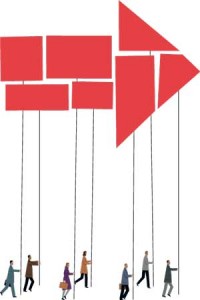 Over time, Brenner’s faculty and staff implemented a variety of interventions in math and reading, from programmatic changes to scheduling. They formed and worked in professional learning communities structured around instruction. And test scores improved.
Over time, Brenner’s faculty and staff implemented a variety of interventions in math and reading, from programmatic changes to scheduling. They formed and worked in professional learning communities structured around instruction. And test scores improved.
“The biggest take-back of the Principals Academy was that it helped me understand and implement myself better in the building,” says Brenner. “I went from managing to being an instructional leader.”
Strong leadership, strong schools
“There are no strong schools without strong leadership,” says Ken Dragseth, director of the University’s administrative licensure program and former superintendent of Edina Public Schools. “School principals are second only to classroom teachers in their importance to student success.”
Research shows that principals impact 25 percent of student learning, yet little professional development is targeted to principals. Since the Principals Academy was established in Minnesota six years ago as part of the U’s College Readiness Consortium, it has helped to train more than 300 school leaders. The academy has used an executive development curriculum developed by the National Institute of School Leadership (NISL).
Brenner’s story is just one of many that illustrate the academy’s personal and statewide impact. Jessica Cabeen applied and was accepted into a cohort held in Rochester as a special-education supervisor in the Austin Public Schools.
“Having the time to read relevant literature and discuss with other professionals was priceless,” says Cabeen. “Looking at context and reality with other districts across Minnesota allowed me time to think through how practices back in my district could change or impact students.”
In the Principals Academy, Cabeen discovered her passion to lead a school building. Today all 400 of Austin’s kindergarteners attend one of the all-day/everyday programs at Woodson Kindergarten Center where she is principal.
“The academy gave me more rigor and helped me articulate that,” she says. “My position has also allowed me to become a strong voice for stuedents with diverse needs as well as the importance of all-day kindergarten and strong preschool programs.”
Mary Jo Schmid, part of Brenner’s cohort, retired in June and calls the Principals Academy a highlight of her career.
“It gave me the information, insight, and training to lead a school into the 21st century,” says Schmid, who was a principal in Moorhead. “Not only did I become a learner, but also the staff at our school valued what I was able to share with them. We were able to pull ourselves through old paradigms and refocus our efforts on our students’ learning, not the excuses for why we couldn’t meet their needs.”
Dragseth credits the cohort model as a key to success.
“You get to know each other so well and can call on people all over the state,” he says. “You build perspective on differences and similarities across districts so you can support students all over the state. You come away with a higher-level appreciation of what people can do.
“When you’re in the Principals Academy,” he adds, “we want you to be not only a great principal but a great state leader.”
New features, new cohorts forming
With the College Readiness Consortium’s move into the College of Education and Human Development this year, the Principals Academy has a new home in the Department of Organizational Leadership, Policy, and Development (OLPD). In preparation for the change, Dragseth led the program through a year-long study, surveying the state’s 1500 principals, past participants, and models beyond the NISL curriculum. They stuck with the model and enhanced the content.
When the next cohort of the Principals Academy meets for the first time in October, it will embark on a program with several new components, including instructional practices for special education and English language learning, teacher and principal evaluations (mandated principal evaluations begin statewide this year), community engagement, and guest lectures from CEHD faculty and staff.
Eight days of training are held during each school year and the remaining 14 days during breaks.
Finally, for school leaders who complete the academy and then enroll in an OLPD doctoral program, 12 elective academic credits will be waived.
One or two more cohorts are expected to begin in 2014, including one in northwestern Minnesota.
Learn more
Learn more about the program and see a short video at Minnesota Principals Academy.
Read Ken Dragseth’s post about key challenges school leaders must address and six ways for principals to create a high-performing school on CEHD’s Vision 2020 blog.
Read a related story about state-by-state differences in effective school leadership and other findings of a national study on school leadership that is now being used by leaders in states including Alaska.
Story by Gayla Marty | Fall 2013
The promise of PRESS: Now entering its third year, a partnership to improve literacy is showing results
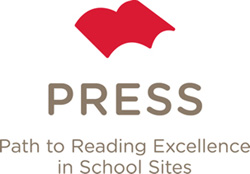 Literacy coach Anne Ittner gives an example of the encouraging growth she is seeing in her students’ reading skills.
Literacy coach Anne Ittner gives an example of the encouraging growth she is seeing in her students’ reading skills.
“Last year I worked with a third-grade student who came into the intervention group practicing sounding out words,” says Ittner. “She was well below grade level in her reading fluency. After five months of focused instruction and goal setting in decoding and fluency, she gained confidence and excitement about reading. By spring, she was reading at grade level. She couldn’t wait to get home to tell her mom!”
Ittner works at Best Academy and Mastery School, two of six PRESS sites in Minneapolis. PRESS is a comprehensive approach to early literacy, driven by research-based practices. The program incorporates quality core instruction, data-driven instructional decisions and interventions, expanded support for English learners, and meaningful professional development to support systemic change.
Nearly one in four third-graders in Minnesota today is failing to reach basic levels of literacy. That means 15,000 children each year. Research shows that if students don’t read proficiently by third grade, odds are that they will not catch up.
Such distressing numbers motivated the Minnesota Center for Reading Research (MCRR) to form a partnership in 2011 with the Target Corporation, Minnesota Reading Corps, Minneapolis Public Schools, and two charter schools to examine the issue and act. Together they formed the Path to Reading Excellence in School Sites, or PRESS. Their goal: Getting all students reading at their grade level by third grade.
The PRESS sites include nearly 1,800 students in grades K-3. At the end of year two, the results are promising:
• Approximately 70 percent of K-3 students receiving PRESS interventions made at least one year’s growth in one year’s time, considerably higher than students who were not proficient readers and did not receive PRESS intervention.
• In kindergarten, PRESS reduced the number of students performing below grade-level proficiency by 27 percent, creating a strong foundation for these young children to carry forward their success into future grades.
How PRESS works
Before students start to bustle through school hallways, PRESS is already in action. University faculty and literacy coaches have met with principals and introduced teachers to ways of collecting and analyzing data. They’ve provided the PRESS Intervention Manual and taught teachers and staff how to use it.
Interventions cover a range of literacy skills including phonemic awareness, phonics, fluency, vocabulary, and comprehension. For example: Students may match picture cards to their initial, medial, or final letter sounds on a game board. They may use letter cards to create new words by replacing one letter. Students may read passages together in pairs, check for errors, and answer questions.
In the first months of the school year, students are evaluated using common benchmark assessments. Faculty and coaches then facilitate grade-level data meetings to help teachers analyze student data and strategize and implement plans for interventions. Year round, PRESS staff work collaboratively with schools behind the scenes–aiding in data collection, tracking, and analysis and training teachers on intervention methods–and give day-to-day support to students by providing individualized interventions.
The PRESS development team is led by faculty members Lori Helman in the Department of Curriculum and Instruction and Matthew Burns and Jennifer McComas in the Department of Educational Psychology. At each site, a literacy coach provides guidance and support to teachers. Together the teachers and coach analyze student data to better make instructional decisions and implement classwide interventions that meet students’ needs.
Literacy assistants–who are current CEHD graduate students–team with Minnesota Reading Corps members to plan and deliver individualized literacy interventions to students who are reading below proficiency level, helping them to meet grade-level literacy goals.
The effect of PRESS is twofold:
• Coaching and professional development help teachers implement classwide reading interventions and data-based decision-making in their classrooms to the benefit of all students.
• Small groups of struggling students receive much-needed individualized support to increase their proficiency levels.
This multi-tiered approach was welcomed at Pillsbury Elementary School in northeast Minneapolis.
“We work very collaboratively to make sure our children receive the instruction they need,” says principal Laura Cavender. “PRESS was a natural fit for our school. The University faculty shared their knowledge and expertise, and the PRESS coach became an important part of our Instructional Leadership Team, helping to disaggregate data, research strategies, provide coaching for teachers, lead instruction and provide leadership for tutors that work with our students.”
Next steps
The need to “catch students up” in reading is a priority across the nation. According to the National Center for Education Statistics, only 34 percent of fourth-grade students demonstrated at least proficient reading skills in 2011; among economically disadvantaged students it was only 17 percent. A long-term goal of PRESS is to introduce its model to other schools across the nation.
Now in its third year, PRESS continues to provide support in its partner schools as well as share what is being learned. Twin Cities school districts have shown considerable interest in PRESS, which will likely lead to increased implementation in the upcoming school years and will continue to move the mission forward.
“PRESS is an opportunity for a team of partners to come together to work on a critical educational problem,” says Helman. “As university faculty, we are proud to contribute to this important work.”
Learn more about PRESS at the Minnesota Center for Reading Research.
Story by Shona Burke | Fall 2013
